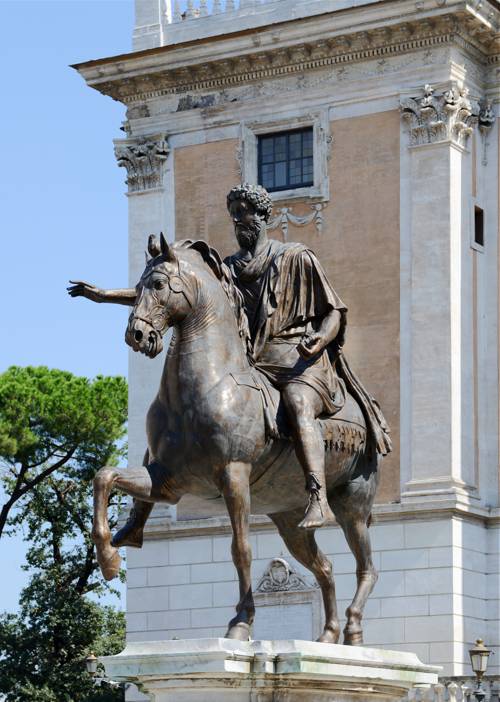
FAQ About Marcus Aurelius

Who was Marcus Aurelius?
Marcus Aurelius was a Roman Emperor who ruled from 161 to 180 AD. He is widely known not only for his role as emperor but also for his philosophical writings, particularly his work 'Meditations'. As a dedicated Stoic, Marcus Aurelius endeavored to apply philosophy to his rulership, making him a unique figure in Roman history.

What is 'Meditations' by Marcus Aurelius?
'Meditations' is a series of personal writings by Marcus Aurelius, penned as a source of his own guidance and self-improvement. These writings highlight his Stoic philosophical beliefs and reflect on issues such as duty, humility, and the nature of the universe. The work is praised for its profundity and has been widely read and admired for centuries.

What are the core principles of Stoicism according to Marcus Aurelius?
According to Marcus Aurelius, Stoicism emphasizes living virtuous lives in accordance with nature. Some of the core principles include practicing self-control, remaining indifferent to pleasure and pain, and focusing on what can be controlled while accepting what cannot. Wisdom, courage, justice, and temperance are the four cardinal virtues central to his teachings.

How did Marcus Aurelius become emperor of Rome?
Marcus Aurelius became emperor of Rome following the co-emperorship with Lucius Verus after the death of Emperor Antoninus Pius in 161 AD. Though appointed by his adoptive father Antoninus Pius, his ascension was rooted in his esteemed reputation and moral character, making him a respected leader among his peers.

What are some famous quotes from 'Meditations'?
'Meditations' is filled with insightful and reflective quotes. Some famous examples include, "The happiness of your life depends upon the quality of your thoughts" and "You have power over your mind - not outside events. Realize this, and you will find strength." These quotes reflect Stoic themes of internal resilience and self-control.

How did Marcus Aurelius influence Stoic philosophy?
Marcus Aurelius significantly influenced Stoic philosophy by embodying its principles in his life and reign. His writings in 'Meditations' serve as a practical guide to Stoic philosophy, emphasizing real-life applicability. His reflections dealt with everyday challenges facing a leader, thus making Stoicism accessible and relevant to people beyond philosophical scholars.

Why is Marcus Aurelius considered a 'philosopher king'?
Marcus Aurelius is called a 'philosopher king' because he applied philosophical ideas, especially from Stoicism, directly to governance and personal conduct. His reflections and meditations shaped his leadership style, promoting moral integrity, rational thought, and the welfare of his people. This philosophical approach to kingship earned him this revered title.

What role did Marcus Aurelius play in Roman military campaigns?
Marcus Aurelius played a significant role in Roman military campaigns, especially against Germanic tribes during the Marcomannic Wars. He personally led troops and exhibited a balance of strategic acumen and diplomatic efforts, which underscored his commitment to the defense and expansion of the Roman Empire.

How did Marcus Aurelius handle the plague during his reign?
During his reign, Marcus Aurelius faced the Antonine Plague, which severely affected the Roman Empire. His response involved reinforcing medical and public health measures, maintaining civic order, and providing relief efforts despite the challenges to the military and economy. He demonstrated resilience and preparedness in his handling of the crisis.

What was the relationship between Marcus Aurelius and Lucius Verus?
Marcus Aurelius and Lucius Verus were co-emperors of Rome, ruling jointly from 161 to 169 AD. Their partnership aimed to reflect a balanced approach to leadership, though Marcus Aurelius was often seen as the senior partner. Their relationship appeared cooperative, showing a united front during military campaigns and governance challenges.

What impact did Marcus Aurelius have on future generations?
Marcus Aurelius had a profound impact on future generations through his writings, which have influenced both ancient and modern Stoic thought. His meditations provided timeless insights into leadership, ethics, and personal well-being, inspiring leaders, philosophers, and ordinary people to seek wisdom and virtuous living.

How was Marcus Aurelius portrayed in popular culture?
Marcus Aurelius has been portrayed in various forms of popular culture, notably in movies, literature, and art. A famous depiction is in the movie "Gladiator," where he is portrayed by Richard Harris as a wise and contemplative ruler. Such portrayals tend to emphasize his philosophical nature and leadership virtues.

What challenges did Marcus Aurelius face during his reign?
During his reign, Marcus Aurelius faced numerous challenges, including military conflicts like the Marcomannic Wars, the Antonine Plague, and internal political strife. Despite these adversities, his stoic leadership style enabled him to maintain stability and discipline within the empire.

Did Marcus Aurelius write 'Meditations' for publication?
Marcus Aurelius did not write 'Meditations' with the intent of publication. These writings were personal reflections composed to guide and improve his own life as a ruler and philosopher. It was only after his death that 'Meditations' became widely published and celebrated as a philosophical masterpiece.

How did Marcus Aurelius die?
Marcus Aurelius died in 180 AD in the city of Vindobona (modern-day Vienna). It is widely believed that he succumbed to illness, possibly the effects of the Antonine Plague, after years of enduring the hardships of military campaigns and managing the Roman Empire's challenges.

What is the significance of Marcus Aurelius's statue on Capitoline Hill?
The bronze equestrian statue of Marcus Aurelius on Capitoline Hill in Rome is significant as one of the few surviving bronzes from antiquity. Originally misidentified as Constantine during the medieval period, this magnificent statue symbolizes imperial leadership and has influenced equestrian statues throughout Western art history.

How is Marcus Aurelius's rule viewed by historians?
Historians generally view Marcus Aurelius's rule positively, highlighting his philosophical approach to governance and his ability to handle numerous crises. While some question his decisions in succession, his integrity, and commitment to duty, paired with his philosophical insights, are largely celebrated.

What were Marcus Aurelius's contributions to Stoicism?
Marcus Aurelius's contributions to Stoicism are primarily encapsulated in his work 'Meditations', where he distills and applies stoic principles in real-life scenarios. His focus on self-discipline, rationality, and ethical behavior underlines the practical applicability of Stoicism beyond abstract philosophy.

Is 'Meditations' by Marcus Aurelius relevant today?
'Meditations' by Marcus Aurelius remains highly relevant today as it addresses timeless themes of human emotion, personal resilience, leadership, and ethical living. Its focus on inner peace, persistence, and virtue continues to resonate with modern readers, providing practical insights into personal development and coping with life's challenges.

What was Marcus Aurelius's relationship with his successor, Commodus?
Marcus Aurelius's relationship with his son and successor, Commodus, was complex. While he had great hopes for Commodus, the latter's reign is marked by controversy and deviation from his father's stoic principles. Many historians believe that Marcus Aurelius's decision to appoint Commodus as his heir significantly impacted the future stability of the Roman Empire.
